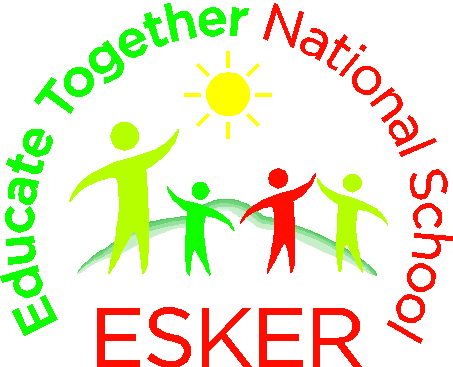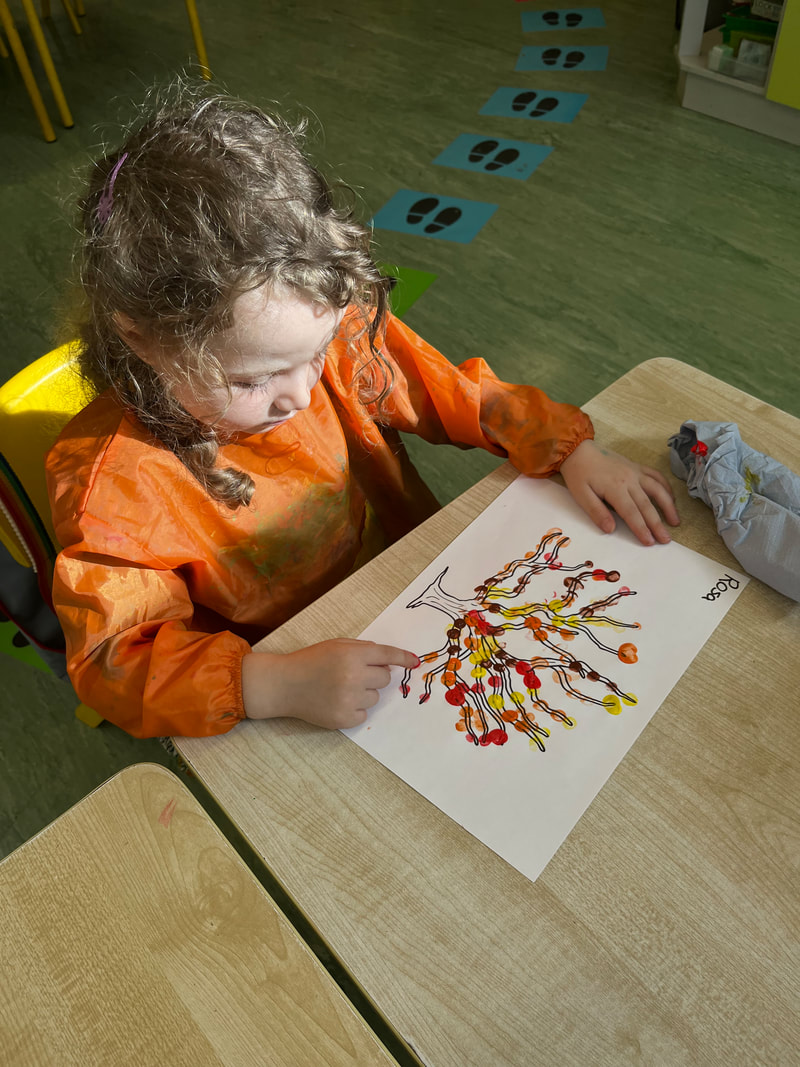Literacy & Numeracy @Esker
Since opening in 2007, we have implemented lots of new and very effective literacy and numeracy strategies in our school.
Literacy Strategies in the School
C.L.O.V.E.R.
This is a very exciting initiative, whereby parents are given tips for reading to their children by our Home School Liaison Officer. The parents receive training and then come in and read to children in groups. Each parent receives a collection of books to read at home and is enrolled in the local library.
Junior Infants Shared Reading
Children in junior infants receive a book each week in the first two terms for their parents to read to them at home. This fosters a love of reading and gives children an understanding of the way in which we read, going from left to right. They also understand that we can read a book (1) using the pictures, (2) using the words or (3) retelling a story that we already know.
Aistear
Aistear is a way of teaching that is used in junior and senior infants to encourage children to develop their oral language capabilities, literacy, numeracy and confidence through the use of role play and other activities in class. Children work in small groups for five different activities, developing their teamwork and communication skills.
Readers After the shared reading programme, children move on to readers. These readers are a mixture of graded phonic and sight word readers. Phonic readers mainly rely on a child knowing all of the letters and the sounds that they make. Sight word readers mainly rely on words that children learn by sight. In the school we use a combination of the Oxford Reading Tree (ORT), Collin's Big Cats and PM+.
Senior Infants Bedtime Reading
Gemma has very kindly organised a Bedtime Reading Club. This is run by the parents, who assist the children in choosing a book to take home every week. It has been a huge success!
Senior Infants Literacy Intervention
In the second term of senior infants, the children participate in a station teaching approach to oral English, reading and writing. Support is provided by learning and language support. Here, the children participate in 5 stations with a teacher at each station: New Reading, Familiar Reading, Oral Language, Writing and Listening stations. The children love getting new books!
First Class Lift-Off to Literacy
In the first term of first class, children participate in a station teaching approach, with support from our learning and language support teachers. Children are assessed and placed into groups and are given different activities, including: New Reading, Familiar Reading, Oral Language and Writing, Work on Words and Comprehension.
Reading Recovery
We have two teachers trained in Reading Recovery. This is an early intervention literacy programme that is aimed at helping children that are struggling with reading. Children are chosen for this intervention by the learning support team.
First Steps Speaking and Listening, Reading and Writing
This is a programme that aims to give children skills that will enable them speak, listen, read and write with confidence. There are many strategies and activities that are used to develop their abilities. To help with comprehension, we also have access to NLD comprehension boxes, The Literacy Box and the SRA Reading Laboratory box.
Learning Support
Children receive additional support on the basis of their test results in the Micra-T (English) and Sigma-T (maths) tests. This may lead to children being helped in class or in the learning support teacher's room.
Language Support
We operate a team teaching model in the junior and senior infant classes. Children all benefit from language enrichment, with small group teaching a wonderful benefit of our programme. From 1st to 6th classes, children that require language support receive a mixture of in-class support and withdrawal in a small group.
Maths Strategies in the school
Ready, Set, Go Maths
This is a maths initiative that works on developing numeracy using very practical, hands-on activities. In class, this often looks like groups of children playing maths games or working with a teacher to improve their confidence and abilities in maths.
Aistear
As well as working on literacy, Aistear enables children to work on their maths skills. This includes using their ‘Maths Eyes’, using money at their pretend shops, counting items when playing, sorting and organising items at the shop or restaurant, writing menus with prices, paying for bills at the vets, reading the time at the train station...the list of possibilities are endless!
Maths for Fun
This is a wonderful programme in first class, whereby Gemma trains parents in the use of maths games. She then brings these parents in to the classroom once a week for several weeks to teach the children how to play the games.
Maths Recovery
We have two teachers that are trained in Maths Recovery. These teachers work closely with individual children that are struggling with maths, as well as with other teachers in supporting maths in the classroom.
Coding
We have been offering a program in Scratch after-school for several years now. Scratch is computer programming that is aimed specifically at children and encourages them to use many different maths skills. It can be used to support all areas of the maths curriculum.
Literacy Strategies in the School
C.L.O.V.E.R.
This is a very exciting initiative, whereby parents are given tips for reading to their children by our Home School Liaison Officer. The parents receive training and then come in and read to children in groups. Each parent receives a collection of books to read at home and is enrolled in the local library.
Junior Infants Shared Reading
Children in junior infants receive a book each week in the first two terms for their parents to read to them at home. This fosters a love of reading and gives children an understanding of the way in which we read, going from left to right. They also understand that we can read a book (1) using the pictures, (2) using the words or (3) retelling a story that we already know.
Aistear
Aistear is a way of teaching that is used in junior and senior infants to encourage children to develop their oral language capabilities, literacy, numeracy and confidence through the use of role play and other activities in class. Children work in small groups for five different activities, developing their teamwork and communication skills.
Readers After the shared reading programme, children move on to readers. These readers are a mixture of graded phonic and sight word readers. Phonic readers mainly rely on a child knowing all of the letters and the sounds that they make. Sight word readers mainly rely on words that children learn by sight. In the school we use a combination of the Oxford Reading Tree (ORT), Collin's Big Cats and PM+.
Senior Infants Bedtime Reading
Gemma has very kindly organised a Bedtime Reading Club. This is run by the parents, who assist the children in choosing a book to take home every week. It has been a huge success!
Senior Infants Literacy Intervention
In the second term of senior infants, the children participate in a station teaching approach to oral English, reading and writing. Support is provided by learning and language support. Here, the children participate in 5 stations with a teacher at each station: New Reading, Familiar Reading, Oral Language, Writing and Listening stations. The children love getting new books!
First Class Lift-Off to Literacy
In the first term of first class, children participate in a station teaching approach, with support from our learning and language support teachers. Children are assessed and placed into groups and are given different activities, including: New Reading, Familiar Reading, Oral Language and Writing, Work on Words and Comprehension.
Reading Recovery
We have two teachers trained in Reading Recovery. This is an early intervention literacy programme that is aimed at helping children that are struggling with reading. Children are chosen for this intervention by the learning support team.
First Steps Speaking and Listening, Reading and Writing
This is a programme that aims to give children skills that will enable them speak, listen, read and write with confidence. There are many strategies and activities that are used to develop their abilities. To help with comprehension, we also have access to NLD comprehension boxes, The Literacy Box and the SRA Reading Laboratory box.
Learning Support
Children receive additional support on the basis of their test results in the Micra-T (English) and Sigma-T (maths) tests. This may lead to children being helped in class or in the learning support teacher's room.
Language Support
We operate a team teaching model in the junior and senior infant classes. Children all benefit from language enrichment, with small group teaching a wonderful benefit of our programme. From 1st to 6th classes, children that require language support receive a mixture of in-class support and withdrawal in a small group.
Maths Strategies in the school
Ready, Set, Go Maths
This is a maths initiative that works on developing numeracy using very practical, hands-on activities. In class, this often looks like groups of children playing maths games or working with a teacher to improve their confidence and abilities in maths.
Aistear
As well as working on literacy, Aistear enables children to work on their maths skills. This includes using their ‘Maths Eyes’, using money at their pretend shops, counting items when playing, sorting and organising items at the shop or restaurant, writing menus with prices, paying for bills at the vets, reading the time at the train station...the list of possibilities are endless!
Maths for Fun
This is a wonderful programme in first class, whereby Gemma trains parents in the use of maths games. She then brings these parents in to the classroom once a week for several weeks to teach the children how to play the games.
Maths Recovery
We have two teachers that are trained in Maths Recovery. These teachers work closely with individual children that are struggling with maths, as well as with other teachers in supporting maths in the classroom.
Coding
We have been offering a program in Scratch after-school for several years now. Scratch is computer programming that is aimed specifically at children and encourages them to use many different maths skills. It can be used to support all areas of the maths curriculum.

